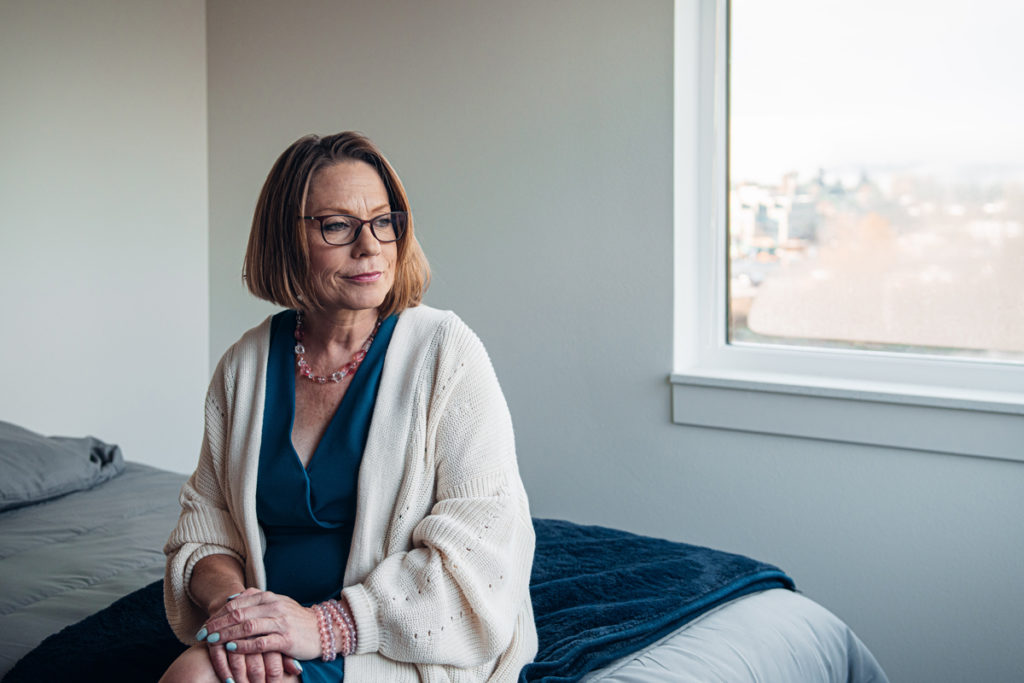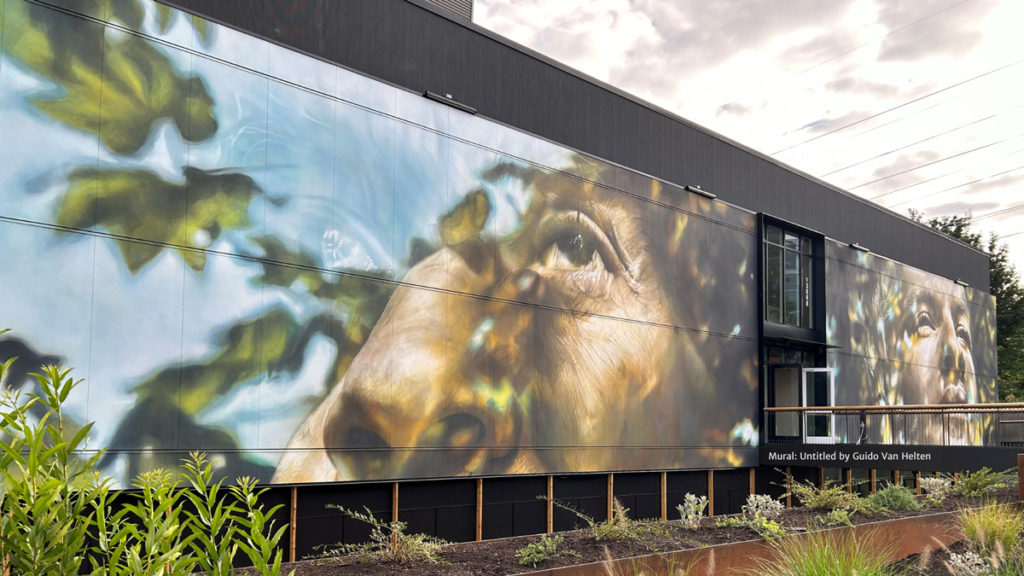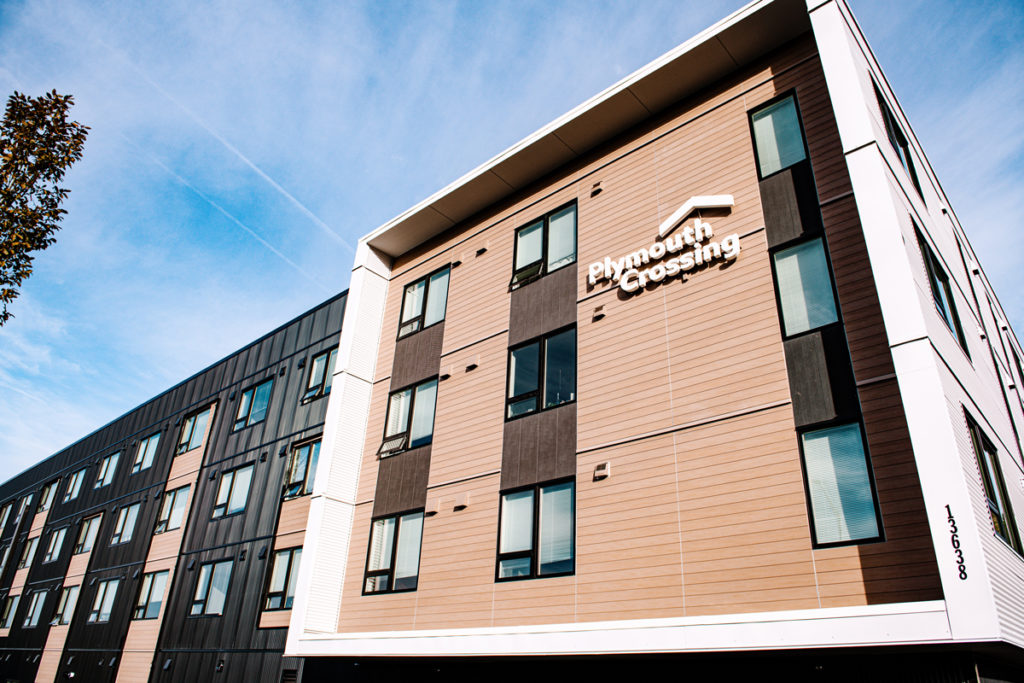What’s the difference between permanent supportive housing and a ‘homeless shelter’?
Posted January 31, 2024
A shelter helps someone in crisis. Permanent supportive housing helps people leave homelessness behind forever. Both are vital to addressing our region’s homelessness crisis.
When Kim made her way to a shelter in Snoqualmie, she was escaping an abusive relationship. The harrowing ordeal had lasted for almost seven years and left her emotionally broken.
“I left with just the clothes on my back,” Kim says. “At times, I slept outside on the sidewalk.”

For Plymouth Housing residents like Kim, living at a temporary shelter is often a first step before moving into a permanent living situation.
From the Snoqualmie shelter, Kim was able to get into Plymouth Crossing—permanent supportive housing in Bellevue. Now, Kim has a home where she can live for as long as she wants. She’s getting the support she needs to rebuild her life through on-site supportive services. Her doctor will even see her in our own building.
“When I walked into my apartment for the first time, I was filled with relief—I mean, overwhelmed with joy.”
What is a shelter?
For Kim, a shelter was not her final destination—rather, a stop on her journey out of homelessness.
“A shelter is a place where we save peoples’ lives,” says Ryan Murk, housing senior manager at PorchLight, which operates the men’s shelter next to Plymouth Crossing. “We can provide three meals, a place to sleep, and warm blankets.”
For Murk, getting his clients into a permanent living situation is always the goal. But unfortunately, it can take a long time—sometimes years—to get into housing in King County.

PorchLight’s men’s shelter in Bellevue is just steps away from Plymouth Crossing. The shelter features mural by artist Guido Van Helten.
So a big part of the shelter staff role is helping people not lose hope. Volunteers are also critical—not only for helping to cook a meal or maintain the space; even just interacting with shelter clients is a big help.
“When people are isolated and alone, they tend to break.” Murk says, “If you can provide someone with a bit of human connection, it goes so, so far.”
What is permanent supportive housing?
“We need shelters because people need a place to go immediately if they get kicked out of their house, if they are unsafe, if they are going to freeze at night,” said Taryn Collis, site director at Plymouth Crossing. “And we need permanent supportive housing because that’s the true solution.”
Unlike a shelter—which is not intended to be a long-term living situation—permanent supportive housing (PSH) is a true home. One can stay for as long as they like. PSH also addresses the root cause of someone’s previous homelessness by providing customized services on-site.
For example, if a resident is struggling with their mental health and also uses a wheelchair, they could be connected with counseling, plus regular medical care to navigate their physical limitations. All of these factors may have contributed to their homelessness in the first place.

At Plymouth Crossing, residents have access to a range of on-site supportive services including housing case management, physical and behavioral health care, 24/7 front-desk staffing, and more.
Because PSH offers such customized support, this method of housing statistically leads to positive outcomes for individuals. It’s considered a national best practice. At Plymouth Housing, one of the largest PSH providers in the Pacific Northwest, more than 95% of people remain stably housed long-term.
Beyond the individual human being impacted, PSH is proven to lower the burden on communities through reduced emergency room visits and hospital and jail stays.
From Homelessness to Housed
If a shelter is kind of like the lifeguard, saving a person’s life when they are drowning, then permanent supportive housing is almost like the person who helps you learn (or re-learn) how to swim—plus how to navigate any storms that might lie ahead on your journey.
Murk has seen people go from the equivalent of treading water to rediscovering the simple joys of being alive. Sixteen of his previous clients who were staying in the shelter just months ago are now at Plymouth Crossing next door. These men are no longer experiencing homelessness; rather, they are experiencing what it’s like to be tenants with a safe apartment to come home to each day.
“I wish people could see beyond someone’s homelessness,” Kim said. “Even though every day was very scary on the streets, I met smart, incredibly talented people in every way. They could play piano. They ran companies. They were veterans. They had children and families before something happened to get them in that place.”
Learn more about Plymouth’s work. Learn more about PorchLight at porchlightcares.org.

Kim is one of nearly 1,400 residents who call Plymouth Housing home. At Plymouth, more than 95% of people leave homelessness behind forever, thanks to an innovative approach that prioritizes a person’s well-being on the path to stability.